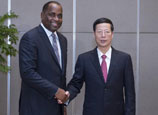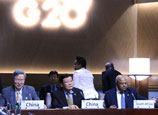
FILM INDUSTRY REFORM
The Chinese began dreaming of their own films and cinemas in 1905, when three reels of film were produced from a shoot in a Beijing photography shop's courtyard of a Peking Opera star performing "Dingjun Mountain."
For over a century, the domestic film industry has rode the waves of differing fortunes.
The industry reached a climax in 1977, in the wake of the the Cultural Revolution (1966-1976), when attendance of movie screenings across the nation reached a record 29.3 billion.
But the market was on a downward spiral until the nation began transforming its cinemas from state-owned enterprises into private operations in 2002 amid a broader shift in the country from a planned economy to a market economy.
In 2002, following China's accession to the World Trade Organization, authorities allowed greater cross-border trade and gave private capital more play. Restructuring of the state-owned film corporations and establishment of private studios also brought the domestic film industry into a rapid path of commercialization.
That year, "Hero," directed by internationally prestigious director Zhang Yimou, became a hit both home and abroad with box offices, raking in a record high of 117 million yuan worldwide.
The star-studded, big-budget movie, featuring Jet Li, Maggie Cheung and Zhang Ziyi, was seen as a turning point at which the nation's film industry stepped into the big time.
Since "Hero," the domestic film industry has witnessed what industry insiders have dubbed "the third phase of big-budget movies" featuring special effects and expensive 3D or IMAX formats, according to Ye.
But a sudden slump in 2012 as well as the success of low-cost comedy "Lost in Thailand" signaled yet another turnaround.
By July 2012, the box office for domestic films had hit a five-year low of 2.8 billion yuan. Only 5 percent of 141 China-made movies screened in the first half managed to break even, and all the others were losing money, suggested official statistics.
The drop came months after China amended rules in February 2012 to up the annual quota of foreign films allowed to be screened in the country's cinemas from 20 to 34.
"The situation was partially because of tepid demand for ancient costume movies, which are more likely to get through censorship," added Huang Qunfei, chief manager of the Beijing-based New Film Association.
In the meantime, "Lost in Thailand," a drama helmed by an actor-turned-director that gained 1.2 billion yuan in box office receipts, topped the screening charts over "Titanic 3D" and was the second-most lucrative domestic Chinese film ever.
Shi Chuan attributed the success of "Lost in Thailand" to the consuming power from second- and third-tier cities.
Despite the high ticket revenue of the movie, it was also widely criticized for being vulgar and of little artistic value.
Shi worried capitalization might one day prevail over a film's artistic value when investors tend to choose genres that are more "emotionally appealing" to their taste.
As Ye Xindai put it, rapid economic development and young people's desire for material abundance might eventually churn out "funny but shallow stuff."
"As I see it, it is the artistic value of the film that matters most, not the rocketing ticket sales," said the young critic.


















 Floodwater gushes from sluices of Gezhou Dam, China's Hubei
Floodwater gushes from sluices of Gezhou Dam, China's Hubei


![]()
